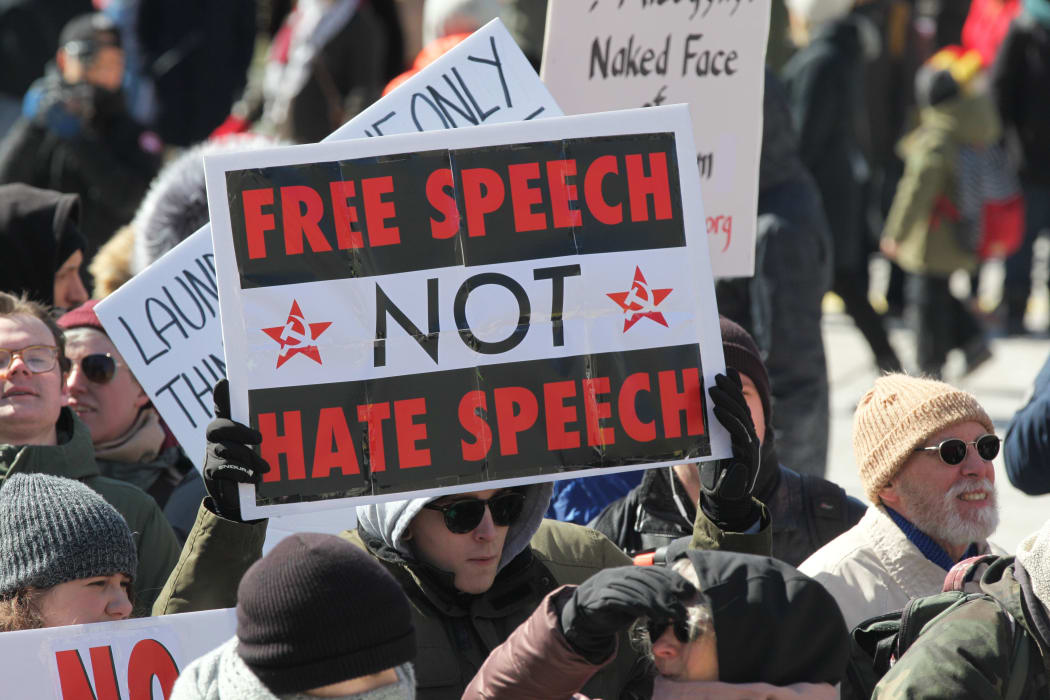What is the line between free speech and hate speech? What do we know about how prevalent online hate speech is in New Zealand, and how does this impact on social cohesion in our society?

A pro-Muslim protestor carrying a sign saying 'Free Speech NOT Hate Speech' as opposing groups of protesters clashed over the M-103 motion to fight Islamophobia during pro-Muslim and anti-Muslim demonstrations in downtown Toronto; Ontario; Canada; on March 04; 2017. Photo: AFP
Sticks and Stones from Central Otago is a group of primary and secondary school kids who are looking at what happens online.
Massey University Pro Vice-Chancellor and Distinguished Professor in Humanities and Social Sciences, Paul Spoonley, has asked them to write a manifesto for New Zealand, outlining what is, and what isn’t acceptable online behaviour.
“I think out of that we’ll get the beginning of a discussion of what constitutes hate speech,” he says.
Although he says, one of New Zealand’s national experts in this area, Jeremy Waldron, believes Section 61 of the Human Rights Act is a perfectly good place to start.
He read Kathryn Ryan the section:
“The extent to excite hostility or ill will or bring into contempt or ridicule any group or persons on the grounds of race, ethnic and national origins.”
While Waldron suggests this is as good as it gets internationally, Spoonley says it has big holes and these grounds are problematic because they don’t include race, disability, gender, sexuality or religion.
The last time anyone was prosecuted under this section of the Act was in 1977.
Spoonley believes the severity threshold for hate speech needs to be set quite high. Considerations like the intent of the speaker, where it takes place and the potential for harm, all need to be taken into account, he says.
Laws in England rule out anything that is in a private space, says Spoonley.
But what’s private and what’s public and how does online space come into this?
“I think we’d have to have a debate about it,” he says.
While some may say that we need new legislation altogether, Spoonley would disagree.
“I think we need to define inside our legislation much more clearly than we do, and that’s probably a combination of the Harmful Communications Act and the Human Rights Act, but what we need to do is talk about what the issues are.”
Netsafe and Action Station research shows that while 30 percent of us are aware of hate speech online, only 10 percent of us are exposed to it.
“One of the things that I would dearly like us to have is an informed debate, and that informed debate requires us to understand what’s happening in our community.”
He says something that has come out of the Christchurch terror attacks is the knowledge that there is no agency that records hate crimes or hate speech.
We really do not know how prevalent hate speech is here, he says.
“We need someone to record and tell us so that we can understand the nature of the issues and the extent of the issues.”
Spoonley was part of a group that wrote a paper for Cabinet on social cohesion but says it was something they weren’t interested in at the time.
“In the last five years we’ve had almost 300,000 new New Zealanders (net gain) and we need to pay attention to how they’re being welcomed and treated in our communities, otherwise if they’re not respected, if they’re not participating, if they’re not integrated into our communities, we’re going to have issues arise.
“Unfortunately we’ve learnt, to our regret, that there are people in our communities who do hate others and we need to identify that as a public good issue on behalf of all of us to make sure that we are a well functioning, respectful community.”

